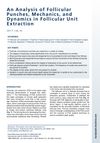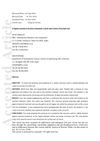 45 citations,
August 2013 in “Facial Plastic Surgery Clinics of North America”
45 citations,
August 2013 in “Facial Plastic Surgery Clinics of North America” Using sharp tools and the right techniques in hair transplant surgery leads to less damage to hair follicles.
 1 citations,
February 1968 in “Surgical Clinics of North America”
1 citations,
February 1968 in “Surgical Clinics of North America” Mechanical methods can make abdominal surgeries easier to perform.
 2 citations,
January 2012 in “Journal of metabolic syndrome”
2 citations,
January 2012 in “Journal of metabolic syndrome” The document concludes that hirsutism can be managed with various treatments tailored to the individual, potentially improving quality of life.
 13 citations,
January 1995 in “Postgraduate medicine”
13 citations,
January 1995 in “Postgraduate medicine” Excessive hair growth in women can be harmless or signal serious health issues, and treatment often includes medication and hair removal, with noticeable results after 3-6 months.
 January 2010 in “Springer eBooks”
January 2010 in “Springer eBooks” Hirsutism can lower a woman's quality of life, causing emotional distress and affecting social and work opportunities.
 August 2018 in “SDÜ SAĞLIK BİLİMLERİ DERGİSİ”
August 2018 in “SDÜ SAĞLIK BİLİMLERİ DERGİSİ” No method fully prevents hair loss from chemotherapy, but some methods can reduce it and improve quality of life.
 12 citations,
May 2005 in “Current obstetrics and gynaecology/Current obstetrics & gynaecology”
12 citations,
May 2005 in “Current obstetrics and gynaecology/Current obstetrics & gynaecology” Hirsutism is too much hair growth in women like the pattern in men, often caused by high male hormones, and can be treated with hormone control and hair removal methods.
7 citations,
January 2013 in “Supportive care in cancer” Hair mass index is a precise way to measure hair loss in chemotherapy patients.
 159 citations,
September 2001 in “European Journal of Cancer Care”
159 citations,
September 2001 in “European Journal of Cancer Care” Chemotherapy-induced hair loss significantly affects patients' well-being, and nurses are key in helping them cope, but more research is needed to find effective treatments.
 14 citations,
March 2010 in “Gynecological endocrinology”
14 citations,
March 2010 in “Gynecological endocrinology” New treatments for excessive hair growth in women include insulin modulators and enzyme inhibitors.
 6 citations,
July 2013 in “Acta Clinica Belgica”
6 citations,
July 2013 in “Acta Clinica Belgica” The document concludes that combination therapy is most effective for treating excessive hair growth in women with idiopathic hirsutism, and more research is needed to understand the condition.
9 citations,
February 2007 in “JAMA” PCOS is a common inherited condition causing cysts, irregular periods, and increased diabetes risk in women.
 7 citations,
August 2018 in “South African Medical Journal”
7 citations,
August 2018 in “South African Medical Journal” Clinicians should understand tattoos to manage health issues, as tattoos can cause complications and affect medical assessments.
 10 citations,
November 2016 in “International Journal of Cosmetic Science”
10 citations,
November 2016 in “International Journal of Cosmetic Science” A tough membrane between the outer and inner layers of human hair protects it from damage.
 3 citations,
January 2024 in “Materials advances”
3 citations,
January 2024 in “Materials advances” Cellulose nanocrystals are promising for making effective, sustainable sensors for various uses.
 22 citations,
August 2011 in “Endocrine Practice”
22 citations,
August 2011 in “Endocrine Practice” Most hirsutism cases are due to PCOS, and treatment focuses on lowering testosterone and blocking its effects.
 47 citations,
October 1989 in “Circulation Research”
47 citations,
October 1989 in “Circulation Research” The study explains how minoxidil sulfate causes vasodilation in rabbits by opening potassium channels and inhibiting calcium channels.
 263 citations,
February 2013 in “Wiley interdisciplinary reviews. Nanomedicine and nanobiotechnology”
263 citations,
February 2013 in “Wiley interdisciplinary reviews. Nanomedicine and nanobiotechnology” Polymeric nanoparticles show promise for treating skin diseases.
 7 citations,
January 2018 in “International Journal of Trichology”
7 citations,
January 2018 in “International Journal of Trichology” Taking 5 mg/day finasteride can cause side effects in women with hair loss, but these are usually mild and fade over time, making the treatment beneficial in the long run.
 19 citations,
May 2021 in “Clinical, Cosmetic and Investigational Dermatology”
19 citations,
May 2021 in “Clinical, Cosmetic and Investigational Dermatology” Minoxidil and finasteride are the best for non-scarring hair loss; more research is needed for scarring hair loss treatments.
January 2025 in “Pharmaceuticals” Nanocarriers can improve antioxidant delivery to the skin but face safety and production challenges.
 1 citations,
March 2019 in “International Journal of Cosmetic Science”
1 citations,
March 2019 in “International Journal of Cosmetic Science” The model predicts hair breakage based on key hair properties and helps product developers.

Plant-based compounds can improve wound dressings and skin medication delivery.

Plant roots respond to fungus smells by possibly using certain proteins and a plant hormone to change root growth, but more research is needed.
 24 citations,
September 2014 in “Drug Delivery”
24 citations,
September 2014 in “Drug Delivery” Using microneedles before applying eflornithine cream can make it more effective at stopping hair growth.
 19 citations,
January 2007 in “Dermatology”
19 citations,
January 2007 in “Dermatology” Unwanted facial hair significantly impacts over 40% of women's psychological and social well-being, and various treatment options are available.
 52 citations,
June 1999 in “Endocrinology and Metabolism Clinics of North America”
52 citations,
June 1999 in “Endocrinology and Metabolism Clinics of North America” Antiandrogen treatments combined with oral contraceptives can help manage hair growth and hair loss in women with PCOS.
 1 citations,
September 2001 in “Dermatologic Therapy”
1 citations,
September 2001 in “Dermatologic Therapy” Estheticians in dermatology improve patient satisfaction and loyalty with proper training and planning.
 12 citations,
November 1993 in “International Journal of Dermatology”
12 citations,
November 1993 in “International Journal of Dermatology” The document explains that hirsutism, often caused by hormonal issues, can be managed with treatment to improve both physical appearance and mental health.
20 citations,
September 2015 in “Pediatric Annals” PCOS in teen girls should be managed with lifestyle changes and sometimes medication to improve symptoms and health.


























